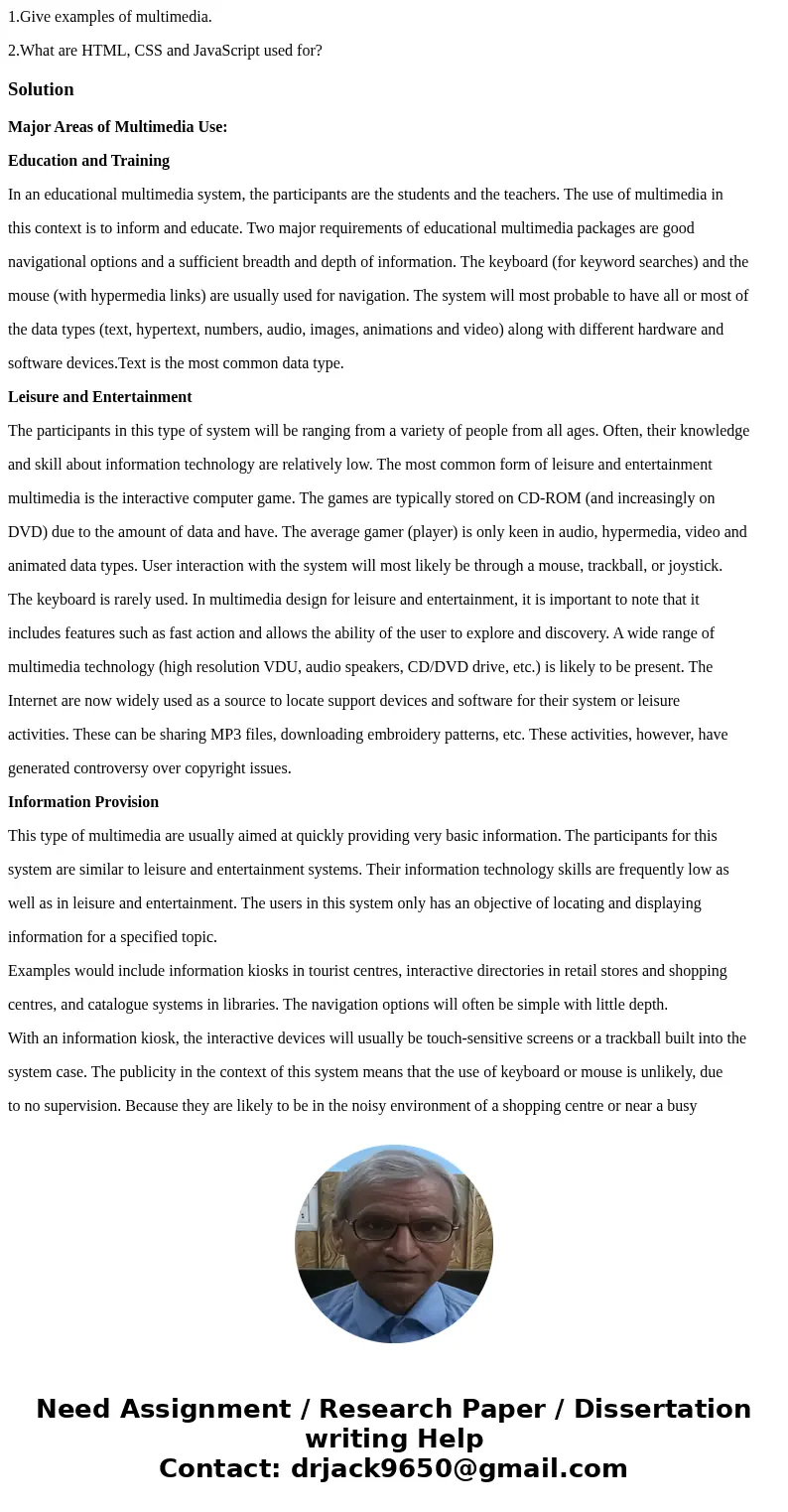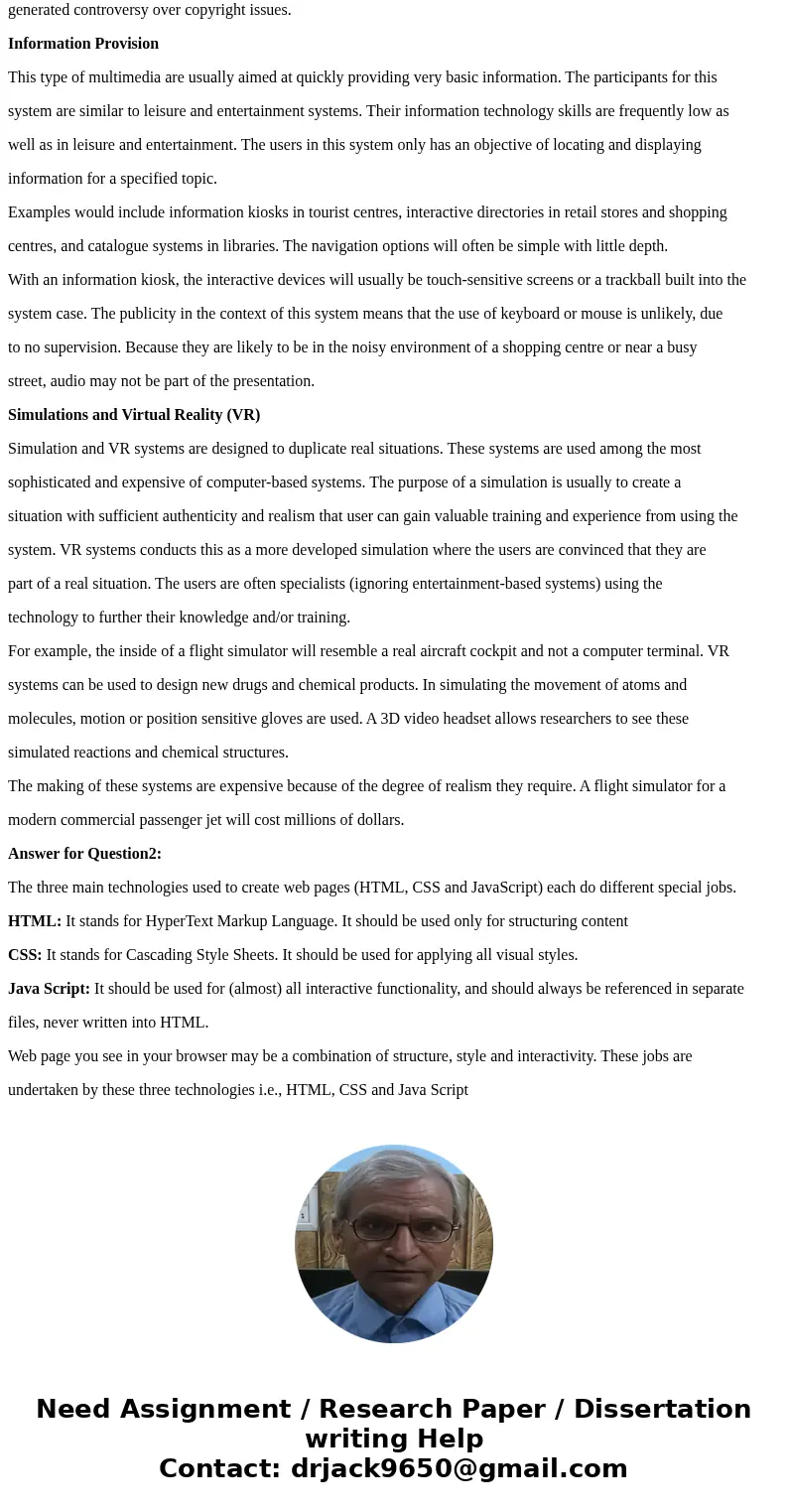1Give examples of multimedia 2What are HTML CSS and JavaScri
1.Give examples of multimedia.
2.What are HTML, CSS and JavaScript used for?
Solution
Major Areas of Multimedia Use:
Education and Training
In an educational multimedia system, the participants are the students and the teachers. The use of multimedia in
this context is to inform and educate. Two major requirements of educational multimedia packages are good
navigational options and a sufficient breadth and depth of information. The keyboard (for keyword searches) and the
mouse (with hypermedia links) are usually used for navigation. The system will most probable to have all or most of
the data types (text, hypertext, numbers, audio, images, animations and video) along with different hardware and
software devices.Text is the most common data type.
Leisure and Entertainment
The participants in this type of system will be ranging from a variety of people from all ages. Often, their knowledge
and skill about information technology are relatively low. The most common form of leisure and entertainment
multimedia is the interactive computer game. The games are typically stored on CD-ROM (and increasingly on
DVD) due to the amount of data and have. The average gamer (player) is only keen in audio, hypermedia, video and
animated data types. User interaction with the system will most likely be through a mouse, trackball, or joystick.
The keyboard is rarely used. In multimedia design for leisure and entertainment, it is important to note that it
includes features such as fast action and allows the ability of the user to explore and discovery. A wide range of
multimedia technology (high resolution VDU, audio speakers, CD/DVD drive, etc.) is likely to be present. The
Internet are now widely used as a source to locate support devices and software for their system or leisure
activities. These can be sharing MP3 files, downloading embroidery patterns, etc. These activities, however, have
generated controversy over copyright issues.
Information Provision
This type of multimedia are usually aimed at quickly providing very basic information. The participants for this
system are similar to leisure and entertainment systems. Their information technology skills are frequently low as
well as in leisure and entertainment. The users in this system only has an objective of locating and displaying
information for a specified topic.
Examples would include information kiosks in tourist centres, interactive directories in retail stores and shopping
centres, and catalogue systems in libraries. The navigation options will often be simple with little depth.
With an information kiosk, the interactive devices will usually be touch-sensitive screens or a trackball built into the
system case. The publicity in the context of this system means that the use of keyboard or mouse is unlikely, due
to no supervision. Because they are likely to be in the noisy environment of a shopping centre or near a busy
street, audio may not be part of the presentation.
Simulations and Virtual Reality (VR)
Simulation and VR systems are designed to duplicate real situations. These systems are used among the most
sophisticated and expensive of computer-based systems. The purpose of a simulation is usually to create a
situation with sufficient authenticity and realism that user can gain valuable training and experience from using the
system. VR systems conducts this as a more developed simulation where the users are convinced that they are
part of a real situation. The users are often specialists (ignoring entertainment-based systems) using the
technology to further their knowledge and/or training.
For example, the inside of a flight simulator will resemble a real aircraft cockpit and not a computer terminal. VR
systems can be used to design new drugs and chemical products. In simulating the movement of atoms and
molecules, motion or position sensitive gloves are used. A 3D video headset allows researchers to see these
simulated reactions and chemical structures.
The making of these systems are expensive because of the degree of realism they require. A flight simulator for a
modern commercial passenger jet will cost millions of dollars.
Answer for Question2:
The three main technologies used to create web pages (HTML, CSS and JavaScript) each do different special jobs.
HTML: It stands for HyperText Markup Language. It should be used only for structuring content
CSS: It stands for Cascading Style Sheets. It should be used for applying all visual styles.
Java Script: It should be used for (almost) all interactive functionality, and should always be referenced in separate
files, never written into HTML.
Web page you see in your browser may be a combination of structure, style and interactivity. These jobs are
undertaken by these three technologies i.e., HTML, CSS and Java Script


 Homework Sourse
Homework Sourse